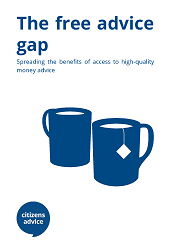The free advice gap: spreading the benefits of access to high-quality money advice
 Successive governments have attempted to improve financial capability, rates of saving among households and attitudes towards retirement planning. Those changes have become increasingly important to families’ financial security as people are given more freedom and choice about how to manage their money. As the government carries out two major consultations on the advice sector, there is a crucial opportunity to reform the advice sector so that more people feel confident with their money and make the right decisions for a financially secure future.
Successive governments have attempted to improve financial capability, rates of saving among households and attitudes towards retirement planning. Those changes have become increasingly important to families’ financial security as people are given more freedom and choice about how to manage their money. As the government carries out two major consultations on the advice sector, there is a crucial opportunity to reform the advice sector so that more people feel confident with their money and make the right decisions for a financially secure future.
We know that many have low financial capability and that this can be a factor in people struggling to budget, deal with financial shocks and plan for the future. Our recent polling found that:
-
13.4 million GB adults find managing money and making financial decisions challenging;
-
18.1 million GB adults say that they rarely or never save, and 11.7 million adults say they have not been able to save any money at all for the future in the past two years; and
-
22.1 million GB adults sometimes or constantly struggle to keep up with their bills or other financial commitments.
While good quality paid-for advice is an important part of improving financial outcomes for households, there is a limit to how affordable this can become, even if the current Financial Advice Market Review does suggest major changes to the paid-for advice sector that allow the price of advice to drop.
Many cannot afford to pay for advice; 49 per cent of households have net financial wealth of less than £5,000.Others will need to use free advice or guidance to appraise their basic options before paying for advice. Free money advice is therefore vital to help more households towards a more financially secure future.
However it is also clear that there is currently a ‘Free Advice Gap’. The free services on offer can be confusing and sometimes don’t work well together. Demand for help from local Citizens Advice often outstrips supply. While access to advice for those with problem debt is currently good and improving, more needs to be done to expand and integrate other types of free money advice. Our report, The free advice gap: Spreading the benefits of access to high-quality money advice [ 0.87 mb], finds that:
-
Up to 4.5 million people have had free money advice in the last two years, but
-
Up to 5.3 million people who said they have needed advice in the last two years have not had it.
-
Of those who said they have needed advice in the past two years but have not accessed it, 14 per cent said they had tried to get free advice but had been told the services were too busy. This suggests that up to 735,000 people may have been unable to access free advice when they sought it due to overstretched services.
-
More than one in ten people - or up to 500,000 - who have taken free guidance in the past two years have seen symptoms of excessive demand including delays and inconvenient appointments.
The Government response to its current consultation on public financial guidance should adopt the following three principles to plug the free advice gap:
-
Trust: Use familiar, trusted and convenient sources to provide advice.
-
Tailored: Ensure that different types of advice are available through different channels to meet people's needs and build their capability in the long term.
-
Timely: Ensure that this advice is available at the times in life when it would be of most benefit to individuals.

